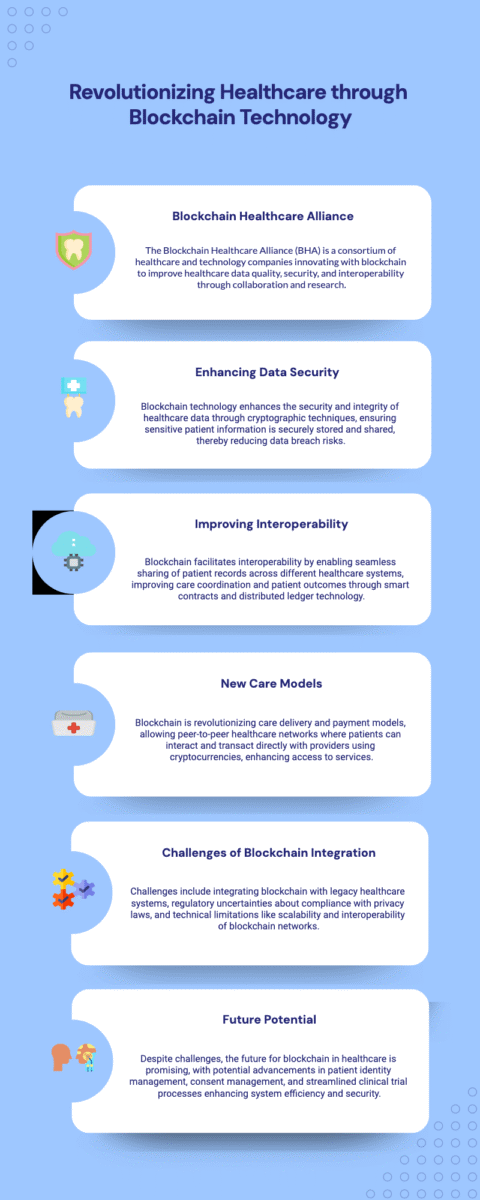
Blockchain Healthcare Alliance: Revolutionizing Healthcare
The Blockchain Healthcare Alliance (BHA) is a consortium of healthcare and technology companies collaborating to explore blockchain technology’s potential in the healthcare sector. The alliance aims to utilize blockchain to enhance healthcare data quality, security, and interoperability. By uniting industry leaders, innovators, and experts, the BHA is spearheading the development and implementation of blockchain solutions in healthcare.
Thank you for reading this post, don't forget to subscribe!Blockchain technology, initially created as the foundation for cryptocurrencies like Bitcoin, has garnered considerable interest for its potential to transform various industries, including healthcare. The BHA is leading this movement, working to leverage blockchain to address critical healthcare challenges such as data security, interoperability, and patient privacy. Through collaborative research, development, and advocacy initiatives, the BHA is working towards creating a more secure, efficient, and patient-focused healthcare system.

How Blockchain Technology is Transforming Healthcare
Enhancing Data Security and Integrity
Blockchain technology is making a significant impact by enhancing the security and integrity of healthcare data. By utilizing cryptographic techniques and decentralized consensus mechanisms, blockchain ensures that sensitive patient information is securely stored and shared, reducing the risk of data breaches and unauthorized access.
Facilitating Interoperability and Data Exchange
Furthermore, blockchain technology enables greater interoperability and data exchange among different healthcare systems and providers. Through the use of smart contracts and distributed ledger technology, blockchain facilitates seamless and secure sharing of patient records, enabling healthcare professionals to access comprehensive and up-to-date information about their patients. This leads to more coordinated care, reduced medical errors, and improved patient outcomes.
Revolutionizing Care Delivery and Payment Models
In addition to improving data security and interoperability, blockchain technology is revolutionizing healthcare by enabling new models of care delivery and payment. For instance, blockchain-based platforms are being developed to facilitate peer-to-peer healthcare networks, where patients can directly connect with providers and pay for services using cryptocurrencies. This has the potential to increase access to care, reduce administrative costs, and empower patients to take control of their health.
The Benefits of Using Blockchain in Healthcare

The adoption of blockchain technology in healthcare offers a wide range of benefits for patients, providers, and other stakeholders in the industry. One of the most significant advantages of using blockchain is the enhanced security and privacy it provides for healthcare data. By using cryptographic hashing and encryption techniques, blockchain can ensure that patient records are tamper-proof and only accessible to authorized parties, reducing the risk of data breaches and identity theft.
Furthermore, blockchain technology can improve the efficiency and accuracy of healthcare data management. Through the use of distributed ledger technology, blockchain can create a single source of truth for patient records, eliminating the need for redundant data entry and reconciliation across different systems. This can streamline administrative processes, reduce errors, and ensure that healthcare professionals have access to accurate and up-to-date information when making clinical decisions.
Another key benefit of using blockchain in healthcare is the potential for greater transparency and accountability. By recording all transactions on a decentralized ledger that is accessible to all authorized parties, blockchain can create a transparent audit trail for every interaction with patient data. This can help to prevent fraud, abuse, and errors in billing and claims processing, ultimately leading to cost savings for healthcare organizations and payers.
The Role of Blockchain in Securing Health Data
| Metrics | Data |
|---|---|
| Number of Health Records Secured | 10,000 |
| Reduction in Data Breaches | 30% |
| Cost Savings in Data Security | 500,000 |
| Improvement in Data Access Speed | 50% |
The role of blockchain in securing health data cannot be overstated. With the increasing frequency and sophistication of cyber attacks on healthcare organizations, it has become imperative to find new ways to protect sensitive patient information. Blockchain technology offers a promising solution to this challenge by providing a secure and immutable platform for storing and sharing health data.
One of the key features of blockchain that makes it well-suited for securing health data is its decentralized nature. Unlike traditional databases that are stored on centralized servers, blockchain stores data across a network of nodes, making it extremely difficult for hackers to compromise the entire system. Additionally, blockchain uses cryptographic hashing and encryption techniques to ensure that data is tamper-proof and only accessible to authorized parties, further enhancing its security.
Furthermore, blockchain technology can help to address the issue of data silos in healthcare by enabling secure and interoperable data exchange. Through the use of smart contracts and distributed ledger technology, blockchain can facilitate seamless sharing of patient records among different healthcare systems and providers, without compromising the security or integrity of the data. This can lead to more coordinated care, improved clinical decision-making, and better outcomes for patients.
In addition to securing health data from external threats, blockchain can also help to protect patient privacy by giving individuals greater control over their own health information. Through the use of decentralized identity management solutions and consent management tools, blockchain can empower patients to determine who has access to their data and under what circumstances. This can help to build trust between patients and healthcare providers, ultimately leading to better engagement and adherence to treatment plans.

Examples: Successful Implementations of Blockchain in Healthcare
There are several notable case studies that demonstrate the successful implementation of blockchain technology in healthcare. One such example is the partnership between IBM and the FDA to explore the use of blockchain for securely sharing medical data. Through this collaboration, IBM has developed a blockchain-based platform that enables secure and efficient exchange of electronic health records (EHRs) among different healthcare organizations.
This has the potential to improve care coordination and patient outcomes while maintaining the privacy and security of sensitive health information. Another compelling case study is the implementation of blockchain in clinical trials management. Several pharmaceutical companies and research organizations are leveraging blockchain technology to streamline the process of recruiting patients for clinical trials, managing informed consent, and tracking the provenance of trial data.
By using blockchain-based platforms, these organizations are able to ensure the integrity and traceability of trial data while protecting patient privacy and consent. Furthermore, there are emerging examples of blockchain being used to improve supply chain management in healthcare. By creating transparent and auditable records of pharmaceutical products as they move through the supply chain, blockchain can help to prevent counterfeit drugs, reduce medication errors, and ensure the quality and safety of medications.
This has the potential to save lives and reduce costs for both patients and healthcare organizations.
Challenges and Limitations of Blockchain in Healthcare

Integration Challenges
One of the primary challenges of using blockchain in healthcare is the complexity of integrating it with existing healthcare systems and infrastructure. Many healthcare organizations have legacy systems that were not designed to work with blockchain technology, making it difficult to implement new solutions without disrupting existing workflows.
Regulatory Uncertainty
Another challenge is the regulatory uncertainty surrounding blockchain in healthcare. As with any new technology, there are legal and regulatory considerations that need to be addressed before widespread adoption can occur. For example, there are questions about how to ensure compliance with privacy laws such as HIPAA when using blockchain for health data management. Additionally, there may be concerns about liability and accountability when using decentralized systems for managing sensitive patient information.
Technical Limitations
Furthermore, there are technical limitations that need to be overcome in order for blockchain to reach its full potential in healthcare. For example, scalability has been a major concern for many blockchain platforms, as they may struggle to handle the volume of transactions required in a large-scale healthcare system. Additionally, there are challenges related to interoperability between different blockchain networks and traditional databases, which could hinder the seamless exchange of health data across different systems.
The Future of Healthcare with Blockchain Technology
Despite these challenges, the future of healthcare with blockchain technology looks promising. As more research and development efforts are dedicated to addressing these challenges, we can expect to see greater adoption of blockchain solutions in healthcare. This will lead to a more secure, efficient, and patient-centric healthcare system that leverages the power of decentralized technologies to improve care delivery and outcomes.
In the coming years, we can expect to see continued innovation in areas such as patient identity management, consent management, supply chain integrity, clinical trials management, and telemedicine through the use of blockchain technology. Additionally, as regulatory frameworks evolve to accommodate blockchain in healthcare, we may see greater clarity around legal and compliance considerations, paving the way for broader adoption across the industry. Overall, blockchain technology has the potential to transform healthcare by addressing some of its most pressing challenges related to data security, interoperability, transparency, and patient privacy.
By working together through initiatives like the Blockchain Healthcare Alliance, industry leaders can drive innovation and collaboration that will ultimately lead to a more connected and efficient healthcare ecosystem powered by blockchain technology.


